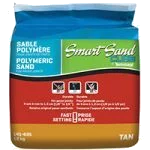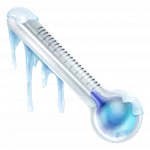As temperatures dip and rise over the next few months, there’s a good chance it’ll drop below 0⁰C for a few days before going back up.
At least until the deep cold of winter fully sets in.
This continual freeze/thaw cycle can impact the strength, appearance and integrity of your interlocking patio stones.
For example:
- Concrete interlocking pavers could crack if they’re old and/or of poor quality
- The joint sand underneath might settle unevenly as it freezes and thaws, causing the stones above to do the same (this is called “heaving”)
- Using the wrong type of bulk salt to remove ice could eat away at your paving slabs
Even though concrete patio stones are tough, there’s still a possibility they’ll be negatively impacted by all the freeze/thaw cycles coming its way.
You can get them ready for it, though, by following these tips from Lane’s Landscaping Supplies.
 Top up the joints between the stones with sand
Top up the joints between the stones with sand
The role of paver sand is to keep your joints in place.
However, over the summer and early fall, wind and rain has probably blown away much of that sand.
If that’s the case, it means there’s not enough sand to keep your stones in place.
And as the weather freezes/thaws over and over again, those interlocking patio stones could shift and slide.
Over the winter, it may not be noticeable. But it’ll be very evident come spring.
Here’s what you should do:
- Look to see if you have the right amount of sand in place (ideally, the level of sand should be approximately 50% of the actual paver height)
- Pour high-quality sand (Techniseal has excellent products you can rely on) onto the bricks
- Sweep the sand into the joints of any patio stones which need it (keeping in mind it should reach about halfway up the side of each paver)
When you’re done, sweep any sand, topsoil or other dirt and debris off the patio stones with your broom.

Use the right products to clear away snow and ice
If you have interlocking pavers for your walkways or driveway, you’ll want to keep them free and clear of ice.
But not all driveway and sidewalk salt is the same.
Yes, they’ll remove stubborn and slippery ice from your stones, but they could also accidentally damage them too.
When it comes to interlock, here are your best options:
- Treated sand: A natural product which won’t freeze (meaning it won’t stick to and eat away at your stones)
- Environmentally friendly ice melt: Safe for groundwater and grass with little chance of corrosion or staining and can be used on any surface
Using standard rock salt (the same type the city uses to clear away streets) isn’t wise.
By nature, rock salt (aka sodium chloride) is designed to be corrosive. Over time, it’ll break down the stone itself.
When it freezes, make sure you use products which aren’t too harmful. And when it thaws, make sure to sweep away any remnants.
 Make sure your patio stones are flat and even before winter hits
Make sure your patio stones are flat and even before winter hits
Got some areas of your patio which are uneven? But not enough that it really bothers you?
You may feel differently once the last freeze/thaw cycle completes.
That minor unevenness could become a major issue because the base underneath will expand and push the pavers up as it freezes.
When the thaw occurs, the pavers may not settle back in the same way. Which means a small imperfection transforms into a big problem.
The only way to really prevent this from happening is to start over with the help of a reliable contractor.
Yup, it means removing the stones and resetting the base underneath so it’s even and laying the stones back on them (before it gets too cold).
Come to Lane’s to protect and preserve your patio stones
Remember how last winter was, for the most part, quite mild?
According to the Canadian Farmer’s Almanac, this winter is supposed to be brutally cold (and start early, too).
So now’s the perfect time to prepare your interlocking stones for the upcoming freeze/thaw cycles.
Contact us with your questions or request a FREE quote on any of our products.



 Top up the joints between the stones with sand
Top up the joints between the stones with sand
 Make sure your patio stones are flat and even before winter hits
Make sure your patio stones are flat and even before winter hits